Ian Irvine's Blog, page 3
October 1, 2014
My Song of the Tears Ebook Covers
My new covers for the Song of the Tears ebooks are done at last. And to celebrate, I’ve made Book 1, The Fate of the Fallen, available free on iTunes, Kobo and Google Play. The book that begins the great Three Worlds saga, A Shadow on the Glass, is also free for a little while. The price is 99 cents on Amazon as I can’t change the price to free, but hopefully they’ll price match. If you like the idea of free books please share this post.
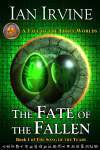
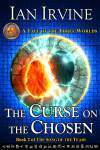
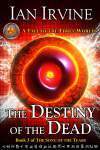
Please note that these editions aren’t available in the UK, Europe and Canada, however my UK publisher’s editions are available there.
The covers were done with the movie animation software Maya, which is like using a nuclear power station to power an electric toothbrush – but it does give them a look unlike any other fantasy covers, and totally appropriate to the books, which is what I really wanted.
For more information, or to read the first pages, see this page on my website.
Filed under: Three Worlds series








June 17, 2014
FANTASY WRITING MASTERCLASS
As promised, here’s the outline of the Fantasy Writing Masterclass I gave at Supanova Sydney on June 13.
Key Points
Who are you, and what do you want to know?
My Story
The Art of Storytelling
Key Elements of Great Stories
Getting Published Today
Staying Published in a Changing World
My Books
Key Resources
Contact Details
Questions
The Art of Storytelling
Want
Obstacle
Action
Resolution
Emotion
Showing
(Key reference, Cleaver, Immediate Fiction)
Want – the Hero’s Goal
He must want something desperately (to survive, escape, win the girl or contest, achieve his destiny, save his family or the world). The story doesn’t start until your hero forms this urgent goal. It doesn’t have to be earth-shaking, but it must really matter to him.
What are his motives? Your readers have to understand what drives him so desperately. Make his motives strong and clear.
What’s at stake if he fails? Life, love, career, health, sanity? Friends or loved ones? The fate of his country? Raise the stakes to the limit.
Obstacle – Why Opponent must Thwart Hero
Who is the Opponent?
He/she/it must want to stop the hero just as strongly. Why is she so determined to defeat the hero?
Opponents can be: an enemy; ally or lover; animal, monster or alien; force of nature (eg flood, fire); an organisation; or society itself.
Constantly ask yourself, How can things get worse? and When is the worst time for them to get worse? Then make it happen.
True character is revealed by how the hero deals with adversity. The worse things get, the more strongly readers will bond to her.
Make sure your hero also faces inner obstacles (eg the ring’s effect on Frodo) and strong inner conflicts.
Action – How Your Hero Fights Back
Your hero must do everything possible to defend herself against the opponent, defeat it and achieve her goal. The opponent must fight back, just as strongly and cunningly, to defeat the hero.
Show their struggle vividly and dramatically, with progressively rising suspense until the climax.
Any scene that does not directly contribute to this struggle will come as an anti-climax. Cut it.
Dialogue is action taken by the characters to get what they want. Every character, in every exchange, should have an agenda.
If you’re stuck, make a list of what wouldn’t happen next. Now, list what could happen. Discard your first 5 ideas; always try to surprise.
Every interaction, between every character (even friends and allies) should contain dramatic conflict, ie conflict related to the hero’s goal – either furthering it or blocking it.
Resolution – Win or Loss
Every scene must have an outcome (a win or a loss), and so must the story.
Most scene endings (even if they seem like a win at the time) should result in the hero being in worse trouble.
At the climax, test the hero’s strength, convictions and conflicts to the limit. Force her to make the impossible choice.
The story ending must resolve the hero’s goal: either a win; a hollow or worthless victory; a compromise; or an outright loss.
How is the hero changed at the end, if he is? Note that some characters never change: eg James Bond, Stephanie Plum, Mr Bean, Hercule Poirot.
Emotion – What’s your Hero Feeling?
Readers identify strongly when you show your hero’s hopes, fears, doubts, guilt and inner conflicts on every page.
Don’t name emotions/feelings (‘He felt guilty.’). Show them the way the character would think; in what he says; how he acts/reacts.
Your readers need to know the hero’s emotions and feelings (and how they’re changing) in every part of every scene.
What are his expectations? Are they too high, or too low? Either way, constantly build them up – only to dash them.
Readers bond strongly to heroes with emotional conflicts eg: love vs revenge, honour vs duty. Heighten such conflicts; show them often.
Inner conflict is at the core of the greatest stories and the most memorable characters in fiction. Make it strong.
Show and (sometimes) Tell -1
Have you Shown, or are you Boring your Readers by Telling? Telling is the author talking. It’s OK for low intensity parts of a scene, but intense emotions & conflicts must be shown, otherwise they won’t resonate with the reader. Showing is the hero revealing what’s happening at each moment, in his own words and actions, filtered through his feelings and attitudes. If it doesn’t create a clear mental picture, it’s not showing.
No reader wants a clichéd version of another author’s story world. Have you created a unique world & setting (how Harry Potter differs to The Lord of the Rings, Casablanca, Gone with the Wind)? Don’t show it in generalities – show it in specific, unique details.
Every setting, and every description, must create a clear mental image – show the blood under the fingernails.
Show and Tell – 2
Have you created a number of memorable, knee-to-the-groin images that bring the story alive?
Are you constantly looking for new twists to overturn clichéd characters, settings, dialogue, action scenes and plots?
Are your chapter beginnings and endings dull and repetitive, or striking, original and compelling?
Do you use the minimum number of viewpoint characters needed to tell the story, and keep to a single viewpoint in each scene?
Are your Characters Ordinary – or Extraordinary
Most characters in most books are dull & forgettable. They fail from too little exaggeration, not too much.
Show your hero’s strengths, humanity and flaws vividly; the opponent should be as strong or stronger, and just as complex.
What’s the hero’s inner need (often unknown to her). What personal flaw must she overcome before she can attain her need?
Bring out your hero’s strongly held attitudes, passions and beliefs. Have him rage, harangue, sneer, scream, mock, be sarcastic etc.
Ordinary or Extraordinary – 2
Give each character a unique voice. Have them say & do things ordinary people never do. That’s why we like to read about them.
Give each character a controlling motivation for the story, eg: Frodo – destroy the ring. Sam – help Frodo. Boromir – save Gondor.
Don’t restrain your characters. Heighten their reactions, emotions, language and imagery until they’re out of control.
To broaden your characters, give each one a secret. Do they have health issues: major or minor, physical or mental? Most people do.
Key Elements of Great Stories
Compelling and Unforgettable Characters
Creating and Heightening Suspense
Powerful External Conflict
Intense Inner Conflict
Showing Inner Conflict and Intense Emotion on the Page.
Compelling Characters
Readers want to care about the characters. They should either be sympathetic, have human virtues or desirable qualities
Readers read for the emotional experience –
– To share the hero’s experiences, feelings, emotions as he tries to reach impossible goal; and
– Experience reader emotions – anticipation, wonder, hope, dread, doubt, shock, joy, sadness
Take readers inside your characters via sympathy, identification and empathy, using sensory & emotion-provoking detail
Transport your readers by showing the hero’s inner conflicts – the storm raging within him, the doubts, guilt, indecision etc.
Suspense
If a writer can maintain suspense, many readers will keep reading even if the characters are flat and the plot is weak (Lukeman).
Suspense arises out of readers’ anticipation of, and worry and fear about, what’s going to happen next.
You create suspense by making your readers fear the worst for a character they care deeply about.
Ask, What can I promise will go wrong?
Make these disasters to come emotionally wrenching.
Make sure you keep every promise to your readers.
External Conflict
Relating to the characters is what makes a story real
We can’t identify with the hero unless her character is revealed. How do we do this?
Through conflict. It forces characters to act in ways that reveal who they really are
The worse things get for them, the more deeply their true character is revealed
And the better it is for the reader.
Inner Conflict
Memorable characters are often tormented by powerful inner conflicts
Intense inner conflict bonds the hero and reader strongly – because hero has everything to lose
Inner conflict creates powerful suspense. Readers don’t know:
– what the hero will do in a crisis
– If his choice will be good or disastrous
– What the consequences will be
The reader takes sides with the hero and her terrible choice.
Showing Emotion on the Page
To deepen flat characters, show how they react to every event – specifically & personally
Show it in real time, ie, as it happens
Show what your hero wants, why she wants it, and what she expects. Dash her expectations
Use all the senses to describe each moment
Use specific detail that the reader can picture clearly
Show her attitudes and judgements in her unique voice
Show how her emotions change through each scene.
Story not Working?
Either readers don’t care about your hero (work on your characters).
Or there’s no suspense because you haven’t made your readers fear the worst.
Solution: rack up the tension.
Promise emotionally-wrenching disasters to come that will devastate the hero and his allies, and shatter his plans.
Great Storytelling References
Lukeman, The Plot Thickens.
Cleaver, Immediate Fiction.
Maass, The Fire in Fiction.
Lyon, Manuscript Makeover.
Vorhaus, The Comic Toolbox.
Bell, Conflict and Suspense.
Iglesias, Writing for Emotional Impact.
Cron, Wired for Story.
Palmer, http://www.crackingyarns.com.au/.
Pixar’s 22 rules of story.
Getting Published Today
Most authors never get their books published.
Of those who do, most books are never reprinted, and never pay royalties.
Few authors make much money from their books. But some do, eg Aussies Garth Nix, Trudi Canavan, Sara Douglass, me, Kate Forsyth, Fiona McIntosh, Kim Wilkins, Richard Harland etc etc.
Publishing is in flux – Amazon, Apple, Kobo
Publishing Yourself
Ebooks are changing everything – anyone can be published now.
Lots of indie authors have done brilliantly, eg JA Konrath, Hugh Howey (Wool, etc).
How to self-publish. There’s a big learning curve
But ebooks never go out of print, and this can only drive book prices down and down.
The way to succeed is to write the very best book you can, no matter how long it takes.
Then another and another. Most successful authors write series. Your next book keeps your backlist selling.
Sample My Books, Free
First chapters of every one of my books and stories http://www.ian-irvine.com/chapters.html
Free book/newsletter signup, http://ianirvine.wordpress.com/2014/05/02/free-ebook-of-a-shadow-on-the-glass/
More Resources
My article, The Truth about Publishing http://www.ian-irvine.com/publishing.html
My article, What Publishers Hate, http://www.ian-irvine.com/publishershate.html
My Article, The One Page Guide to Storytelling, http://www.ian-irvine.com/storytelling1page.html
Jane Friedman’s site, http://janefriedman.com
Hugh Howey, Author Earnings, http://authorearnings.com
Newbie’s Guide to Publishing http://jakonrath.blogspot.com.au
Contacting Me
ianirvine@ozemail.com.au
http://www.ian-irvine.com
https://www.facebook.com/ianirvine.author
https://www.goodreads.com/author/show/153703.Ian_Irvine
Filed under: Appearances, Publishing and Agents, Storytelling








May 1, 2014
Free ebook of A Shadow on the Glass
I’m doing a monthly email newsletter and, to encourage people to sign up, I’m giving away a free e-book of A Shadow on the Glass, Book 1 of my internationally bestselling Three Worlds epic fantasy sequence, which has sold over a million print copies.
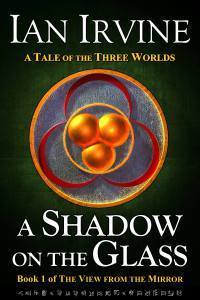 The newsletter will be packed with news about the long-awaited sequel to The View from the Mirror, sample chapters and bonus material no one else has seen, competitions and giveaways.
The newsletter will be packed with news about the long-awaited sequel to The View from the Mirror, sample chapters and bonus material no one else has seen, competitions and giveaways.
Your e-book comes in either:
Epub format, for iPads/iPhones and other tablets/smartphones/computers and e-readers.
Kindle format
or both if you want to.
Happy reading.
Filed under: Mirror Quartet Sequel, Newsletters, Promotions, Three Worlds series








February 28, 2014
First Chapters of Book 1, The Summonstone
I’m currently working on the long-awaited sequel to THE VIEW FROM THE MIRROR, a trilogy which I’ve called THE GATE OF GOOD AND EVIL. The tentative book titles are:
1: The Summonstone
2: The Secret Art
3: The Fatal Gate
Here are the first two chapters of The Summonstone. I’ve taken a small liberty with so called ‘facts’ reported in THE WELL OF ECHOES by an (evidently) unreliable narrator – Karan and Llian have only one child, a daughter, Sulien.
CHAPTER ONE: THE BEATING
What was she to do about Llian?
The ban, which had been in place for seven and a half years now, was eating him alive. It should have been lifted six months ago but the masters had refused, and there were ominous signs that they were going to make it permanent.
A faint, staccato beating sound broke Karan’s train of worry, though before she could identify it, it faded away. A lifetime ban would destroy Llian. Why did they hate him so? What threat could he represent to their smug and well-fed existences?
The beating returned, a little louder – a triple thump followed by a double, two singles and another triple. It repeated again, then again, growing stronger with each cycle. She rolled over and pressed an ear to the middle of Llian’s cool back. His heartbeat, though faster than it should have been, sounded normal.
The beating grew louder, louder. Sulien! Karan threw herself off the high box-bed, landed awkwardly and pain splintered through the thigh bones and pelvis she had broken eight years ago. It was all she could do to stifle a scream.
She clung to the side of the bed, gasping. The flagstones were cold under her bare feet; she pulled a night cloak around herself and limped down the hall towards her daughter’s room. But the pain grew with every step and so did her urgent need for the one thing that could take it away. Hrux!
She suppressed it. Hrux was for emergencies only … for those times when the pain was utterly unbearable.
Sulien lay on her side, her knees drawn up and her arms wrapped around them, breathing steadily. Her hair, as tangled and untameable as Karan’s though a lighter shade of red, fanned out to cover the pillow.
The panic eased. She stroked the child’s brow and Sulien gave a little sigh. Karan smiled and kissed her and shed a tear, and stood there for a minute or two, gazing at her seven-year-old daughter, her small miracle, the only child she would ever have. Triunes were generally sterile, and even after Karan had become pregnant, the terrible injuries had made childbirth perilous for her and the baby. Yet out of all the torment had come the most beautiful, perfect thing in her life.
The beating rose and fell, rose and fell. She pressed a fingertip into each ear but the sound did not change. It was inside her head. Could it be a sign of the madness that had taken her poor mother? No, the beating was real … and sounding increasingly like a threat.
Karan shivered, returned to bed and snuggled against Llian. Where was it coming from? What had just changed to cause it? It felt like an alien heartbeat, freshly woken.
Her right thighbone throbbed. Then the left, and the right again. After she had been hurled against the metal side of Rulke’s construct, on the desperate day that had changed the fate of three worlds, the healers had thought she would never walk again. Had it not been for the healing hands of Idlis, once her enemy, she would be a cripple to this day.
Sleep would not come. She rose and paced down the hall, grimacing with every step. The signs were clear now – the pain would get worse until it became unendurable. Through teeth-gritting force of will she forced it down; she had to be strong, for Sulien’s sake, and Llian’s. She could not give in at the first moment – only at the last.
Karan returned to the bed chamber, took a chain of braided silver wire from the top drawer of the corner cupboard, felt for the little, dangling key and went down the stone stairs in the dark. She dipped hot water from the iron kettle hanging over the embers of the fire and made a cup of chard. It tasted like wet hay and probably was; they could no longer afford real chard. She tossed it out and went outside, looking across the shadowed yard of Gothryme Manor.
There had been little summer rain and none so far this autumn. The ground was so dry she could smell it; dust, lifted by a cool breeze, tickled the back of her nose. The drought was unending and the coming harvest was going to be the smallest in her memory. How was she to feed her people this coming year, if she were still here at all? One disaster after another had taken all her resources and unless a miracle happened – like Llian’s ban being lifted – she would have to sell Gothryme to pay her debts.
Her family’s home for more than a thousand years, gone.
A brutal spasm struck her left thigh. Karan fell to one knee, cracking her kneecap on stone and jarring all the way up to her hipbone. Pain shrieked through her and this time it wasn’t going away. Hrux! She had to have it now.
She lurched back into the kitchen. Her hands were shaking so badly that it took five clicks of the flint striker before she could light the wick of a lantern. She got out a stepladder, took it into the larder and, with great difficulty, climbed up. Only by standing on tiptoes could she reach the small box bolted to the back of the top shelf, well out of sight. She unlocked it, the key rattling in the keyhole, withdrew a small package in a wooden case and opened the lid.
The stench, even from so tiny a piece of hrux, was nauseating. She hesitated. There was barely enough left for two doses and she had no way of getting more. Only the strange and terrifying Whelm knew how the perilous drug was made, and they lived far away. Because Karan had spared Idlis’s life three times, he brought her a small supply once a year, in part-payment of the obligation, but his next visit was weeks away. And what if he was delayed, or waylaid? Or died?
Panic stirred. She fought it down. Dare she try a half-dose? It had failed the first time, but the pain had been so much greater then. She took the box to the kitchen bench, cut off a pea-sized piece of hrux and put it in the middle of her palm. But, though the longing was desperate now, she endured the pain. Not yet … not yet …
Karan had taught herself to put up with it a little longer each time. To do otherwise, to give in too easily, was to risk the hrux claiming her. And hrux addiction was worse than any physical pain.
The pain howled; it shrieked; it battered at her like a mad thing. She couldn’t bear it another second … and another … and anoth–
Karan slammed her palm against her open mouth, chewed the little pellet furiously and washed it down with a mug of water. She doubled over, shuddering; it was bitter as well as foul. After washing the knife carefully, three times, she put it away, replaced the case in the box and locked it again. She settled the silver chain around her neck and felt her troubles ease.
Her head swirled. Tingles ran up and down her legs. She headed for the stairs, then turned back. The effects of hrux could be unpredictable; she might shout or scream and that would wake Llian and Sulien. Karan closed the door to the stairs and sat in a battered armchair in the dark, waiting for hrux to bring its blessed relief.
Waiting …
The beating had stopped. She fingered the chain, which had belonged to a crippled young woman, Fiachra, long ago. Traces of an enchantment laid on it to protect her still lingered. Karan hoped it did a better job than it had done for Fiachra, who had been murdered to cover up a terrible crime.
The room was cold. She pulled the night cloak more tightly around her and lay back in the chair, enduring the shooting spasms in her bones, praying that the dose would be enough and it would not take long to work.
What was she going to do about Llian? He was both a brilliant chronicler of the Histories and a masterly teller of the Great Tales, a rare combination. He was also the first teller in hundreds of years to have crafted a new Great Tale, the Twenty-Third, the monumental Tale of the Mirror. And yet, at most everyday things he was awkward, clumsy, and singularly useless. The Great Tales were his life and his passion, and if he could not practice his art, what did he have left? The ban must be lifted, but how?
Karan put the problem aside for the morrow and closed her eyes, willing herself to sleep. She imagined she was surrounded by a downy blanket, insulating her from all the troubles of the world …
Pain sneaked up her thigh, dull now. She opened her eyes but saw only fog. She must be dreaming, though it did not feel like a dream or a hrux hallucination. No, this was a true seeing, and it was showing her a place she had seen years ago – the void. Karan was a sensitive, and she had been mind-roaming under Rulke’s direction as he tried to find a way through the pitiless void that surrounded Santhenar and all the worlds.
The fog thinned a little, and she jumped. Eyes! Eyes in a man’s face, a heavy black beard, close-cropped, and a jagged tattoo – a glyph she did not recognise – on his forehead. She shrank backwards in her chair. The eyes did not blink but she could tell it was a living person, not a painting. Could he see her? She slid sideways but the eyes did not follow her. They were looking down at an object in front of him, though she could not see it clearly enough to tell what it was – a piece of stone, perhaps. He touched it and the beating sounded once more.
A burst of light reflected in his eyes. They were unusual, deep-set, and a unique colour, indigo blue with hints of carmine. Shivers ran across her shoulders, for that was enough to tell her what he was.
Charon.
And the Charon had been far more than human, physically and intellectually. With just a century of his fellows – The Hundred – Rulke had once captured a world.
The man stood up. He was a foot and a half taller than her, and strongly built. He reached out in her direction as if testing an invisible barrier separating them, and momentarily the scene went out of focus. He dropped his hand, she saw him clearly again, then he looked over his shoulder. More Charon were gathered behind him, heavily armed young warriors, male and female, and all with that jagged tattoo on their foreheads. There were dozens of them, no, hundreds – a mighty force armed as if for war.
Karan scrambled to her feet, her heart thundering. How could this be? There were no Charon any more. After Rulke’s death eight years ago, Yalkara had taken his body away. She and the few dozen surviving Charon, all age-old, had been the last of their kind. She had said they were returning to the void, to face their extinction with dignity.
Clearly, every word had been a lie.
CHAPTER TWO FOLLOWS, BELOW.
The ebooks of THE VIEW FROM THE MIRROR are now available worldwide from Amazon. If you don’t have a Kindle, don’t despair, you can read them on an iPad/iPhone or other tablets with the free Kindle app. The books will be available on the iTunes iBookstore soon.
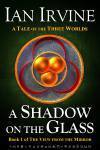
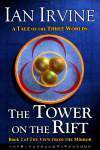
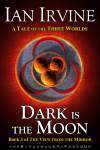
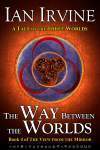
CHAPTER TWO: BENIE
‘It was just a dream,’ said Llian when she told him. They were eating breakfast – gruel with onions and small cubes of fried bacon – on the terrace at the rear of the manor, facing the range known as the Hills of Bannador. They would have been called mountains anywhere else, save that the real mountains reared up behind them, white-capped and unclimbable. ‘It doesn’t mean anything.’
‘I was wide awake.’
‘You’d just taken hrux.’
‘Only a half dose.’
‘It’s a powerful, dangerous drug. Maybe it was a hallucination.’
‘I know what a hrux hallucination is like,’ snapped Karan. ‘This was a true seeing. I saw hundreds of armed Charon, massing in the void as if planning an attack.’
‘On what?’
‘I don’t know.’
Llian sighed. ‘The Charon are extinct,’ he said, evidently trying hard to be reasonable. ‘Rulke was the last fertile one, and when he died the handful of survivors – all elderly – went back to the void to die.’
‘So they said. But the ones I saw last night were young.’
‘Then they can’t have been Charon. Besides, you said they all had forehead tattoos. None of the Charon we met had tattoos.’
‘Who else could they be, with those eyes?’
He shrugged. ‘I heard Rulke’s tales from his own mouth. And I can tell truth from lie – it’s part of my teller’s gift.’
‘I also know when to trust my gift.’
‘Even when you’ve taken hrux?’
Karan fought an urge to whack him. Stupid man! ‘Those soldiers were real, and they were gathering for war. What if it’s war on us?’
‘Why would it be? There could be a million worlds in the void.’
‘I saw them clearly. As if they were on the other side of a window.’
‘But the void folds back on itself – they could have been on the other side of the universe.’
‘Why are you determined to deny everything I say?’
He softened. ‘Because we’ve got more than enough to worry about as it is.’
Karan leaned against him. He put his arms around her.
‘I’m afraid, Llian. Afraid we’re going to lose Gothryme. And if we do, where can we go? We’re practically bankrupt –’ She broke off, but too late.
He wrenched away and threw himself into a chair at the far side of the table. ‘And that’s my fault,’ he said bitterly. ‘I’ve let everyone down.’
‘It wasn’t your fault Wistan banned you from practicing your art.’
‘Yes, it was. He said it all at my trial.’
‘I was there. I don’t need to hear it again.’
But Llian ploughed on, flogging himself in a vain attempt to lift the burden of guilt. ‘I broke the chroniclers’ first law, interfered in the Histories. I manipulated Mendark just to find the answer to a historical curiosity, and a hundred prisoners burned to death in the citadel cells. I still have nightmares about their deaths.’
‘I know, but you didn’t set fire to the citadel. Mendark did – and he tried to burn you alive as well.’
‘But that wasn’t enough for me – oh, no! I provoked Tensor, using my teller’s gift –’
This was too much. ‘You bloody idiot, you were trying to save my life!’ Karan cried.
‘And it went catastrophically wrong, as usual. Tensor ambushed Rulke, treacherously cut him down, and that drove the brilliant, noble Charon into extinction.’ He looked down at his hands as if expecting them to be drenched in blood. ‘That’s why I was banned, and rightly so. I can’t work as a chronicler or a teller … and it’s all I’m good for.’
‘I knew that when I chose you,’ she murmured.
‘You couldn’t have known how bad it was going to get.’
‘I can put up with anything as long as I have Sulien and you.’
But she didn’t have him – that was the problem. A barrier had grown between them and she did not know how to overcome it. He could not confide in her, and they were keeping secrets from each other. Secrets that could tear them apart.
Karan looked across the swan pond, now dry save for a muddy, reeking pool in the middle. Llian took the burden on himself, yet he could do nothing about it, and if he kept on this way it would break him. But what could she do? She had no influence with Wistan or the other masters who maintained the ban. Well, she was not giving up. She was determined to get the old Llian back, infuriating though he could be.
Suddenly Llian cried out, sprang to his feet and made for the axe standing by the woodpile near the door.
‘Ugh!’ she yelped, clutching at her pounding skull. The beating was back.
He froze, his right hand outstretched. His fingers closed, then with an effort he drew back. ‘Karan?’ He turned back to her, his head moving jerkily. His eyes had a shiny, feral glint.
The sound cut off. ‘The beating … it was like a drumbeat, thundering inside my skull.’
The light faded from his eyes and he was Llian again. ‘I can’t hear any beating,’ he said.
‘You’re not a sensitive.’
‘You can say that again!’ His hands clenched and unclenched, involuntarily. His breathing was ragged.
‘Llian, what is it?
‘Just then I felt – I wanted to –’
It was as if he were afraid to say it. No, ashamed to say it. He jerked his head sideways. She followed the gesture, to the axe.
He sat down on his hands, as if to keep them in place. ‘I felt a wild urge to … to run amok. Break windows with the axe. Chop up the plates in the kitchen. Smash the last wine bottles in the cellar …’
She attempted a joke. ‘Given your prodigious appetite for red wine, that’s really worrying.’
He did not smile. ‘I’m afraid, Karan. Afraid of what I might have done.’
She swallowed. Llian had many flaws, but violence was not one of them. With him, anger turned inwards, not out.
‘How long have you been having these feelings?’ she said delicately.
‘Never – until now. It was as if I was drunk. It took all my will-power to pull back from the axe.’
And it had happened at the precise moment the beating started again.
‘Karan!’ came a hoarse cry from the back door. ‘Llian! Come, quickly.’
Rachis, her ancient steward, was hunched in the doorway, panting. Age had withered him; his frame, once tall and upright, was reduced to spindly bone and skin like wrinkled leather. A fluffy white annulus highlighted his bald brown dome. In his eighty-two years Rachis had seen everything, and he was normally unflappable, but now his mouth was opening and closing, his watery eyes staring.
‘Benie,’ he croaked. ‘Benie …’
‘What about him?’ said Karan. Benie was the cook’s apprentice, a good-hearted lad of seventeen, though accident prone. ‘Has he cut himself again? Is it bad?’
‘He’s – he’s murdered Cook. Stabbed him through the heart.’
‘Benie … killed Cook?’ It was preposterous.
But when they reached the kitchen, Cook lay on his back on the flagstones, his arms outstretched. Blood soaked the front of his apron and he was, clearly, dead. Benie was backed up against the door of the larder, a thin-bladed boning knife hanging from his left hand, shivering. Blood dripped from the tip.
Karan held out her hand. ‘Can I have the knife, Benie?’
He handed it to her at once. He looked dazed.
‘What happened?’ said Karan.
‘I – killed – Cook,’ said Benie, shaking his head as if he could not believe it.
‘What did he do? Did he attack you?’
‘No … why would he?’
‘Cook’s got a caustic tongue,’ said Rachis. ‘But he’s not … he wasn’t a hard man.’
‘Why did you do it, Benie?’ said Llian.
‘I don’t know.’
‘There’s got to be a reason.’
‘No. None at all.’
‘Did you hear voices in your head?’ said Rachis. ‘Telling you to kill Cook?’
Benie shook his head. ‘I was boning out a leg of mutton – and suddenly I felt furiously angry.’
‘Why?’ said Karan. ‘What happened?’
‘Nothing. It came from nowhere and couldn’t stop myself. I – just – stabbed – him.’ He looked down at Cook’s body, blanched, and Karan saw the little boy in him, bewildered and terrified. He began to shake and, once started, could not stop. ‘Poor Cook. He taught me so much. I wanted to be as good as he is … better …’
‘Did anything odd happen, before you did it?’ said Karan.
‘No,’ said Benie. ‘Except for that thumping sound.’
‘What thumping sound?’
He tapped it on the bench, the rhythm that Karan kept hearing, the beating. ‘I heard it just before …’
Karan exchanged glances with Llian.
‘What’s going to happen to me?’ said Benie plaintively. ‘They won’t hang me, will they?’
Karan swallowed. He’d been a mischievous little boy, always getting into trouble, but there was nothing she could do about this trouble.
‘I’ll put him in the old cellar,’ Rachis said heavily. ‘And send for the bailiff. Come with me, lad.’ He led Benie away.
‘I didn’t want to hurt him,’ Benie wailed. ‘Cook was good to me. Karan, please help me!’
Karan stood there, fists clenched by her sides. Why, why?
‘Sulien will be down soon,’ said Llian. ‘We’d better do something about the body.’
They carried Cook down to an empty coolroom and locked the door. Llian cleaned up the blood. There wasn’t much. They went out to the orangery and sat among the trees. The small, green fruit were sparse, and the leaves hung straight down, badly wilted. Everything was wilted this year.
‘Is there anything we can do for him?’ said Llian.
Karan sat, head bowed. Benie had been part of Gothryme all his life, and more than half of hers. His mother had died in childbirth, his father was unknown, and he had simply been taken in.
‘It’s got to be the beating,’ she said at last. ‘It affected you too.’
‘But not you.’
She slipped a finger under her braided silver chain. ‘There’s a protection on this. I always feel safe when I’m wearing it … safer, at any rate.’
‘Benie’s a good lad,’ said Llian. ‘He’s worked hard these past years, and we owe him a duty. Do you think we should …?’
‘Let him escape?’ said Karan bleakly.
‘Yes.’
‘How can we? He killed an innocent man, for no reason. Will he kill again, the next time the beating sounds? And the time after that? I can’t take the risk.’
‘What if we hide him somewhere? Lock him up where he’ll be safe.’
‘Forever? No, we can’t. Cook’s poor wife is now a widow, his three children are fatherless, and without his earnings they’ll starve. I’ll have to take them in, and they have to know what happened, and why. It’s only justice.’ She shook her head. ‘How am I going to tell them? Benie, of all people.’
She contemplated that dismal prospect. Llian paced between the orange trees.
‘Benie will be convicted of murder,’ he said.
‘I’ll plead for him,’ said Karan. ‘I’ll do everything I can …’
‘But he’ll still be put to death.’
She covered her face with her hands. There was no solution; the beating had made sure of that. Llian put his arms around her and she scrunched herself against his solid chest.
‘What if they’re connected?’ Lian said after a long pause.
‘What?’
‘You seeing the Charon, and the beating.’
She recalled how it had started again, right after the Charon man had touched the stone. ‘Maybe they are.’
‘What if it’s happening in other places as well? What if the beating is affecting other people?’
Karan hadn’t thought of that. What was it for, anyway?
‘I’ve a very bad feeling, Llian. That we’re standing on the edge of the abyss, and everything we care about, everything that matters, is about to be swept away.’
***
I look forward to your thoughts. https://www.facebook.com/ianirvine.author
More samples will follow in a while.
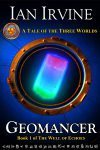
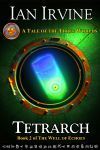
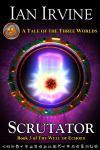
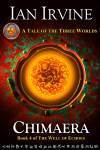
Filed under: Mirror Quartet Sequel, Three Worlds series, Uncategorized








February 24, 2014
Well of Echoes ebooks – brand new covers
Here they are at last, just finished by my son Simon last night. Simon is a movie animator these days (he’s worked on The Hobbit – The Desolation of Smaug, Iron Man 3 and the last Spiderman movie, among others). The books are available from Amazon now, and Kobo and the iBookstore shortly. They only have these covers in places where I hold the rights, such as Australia, New Zealand, the US and its territories, Africa, Asia and the Pacific. In the UK, Europe and Canada, where they’re published by my long-time publisher, Orbit Books, they have the old covers.
Filed under: Three Worlds series








View from the Mirror ebooks – Brand New Covers
Here are my brand new The View from the Mirror covers, finished at last. They were done by my son, Simon. The books are available from Amazon now, and Kobo and the iBookstore shortly. They only have these covers in places where I hold the rights, such as Australia, New Zealand, Africa, Asia and the Pacific. In the UK, Europe and North America, where they’re published by my long-time publisher, Orbit Books, they have the old covers.
Click the first cover to see them full size, as a slide show.




Here’s how they were done, from Simon.
“Yeah it’s pretty simple.
- Start with a 3D model of the triune symbol which is the same for all 4 covers. [Model created in Maya, an incredibly complex program used to create movie special effects]
- Light the model from a different corner of the cover each time, this creates highlights and shadows on the symbol and spheres.
- Then light it from the top with a powerful spotlight, this creates a halo effect around the symbol.
- Light the background with colored lights to force a strong color difference between the cover backgrounds.
- Use different surfaces on the spheres to differentiate them across the covers.
- Apply different light effects to additional lights to create the corruption and/or texture on various selected elements. Up to 15 digital lights are used.
- Jiggle it all around until it looks decent, and apply the notes from the boss (that’s me) as they come in.”
Simple, ha! We went through about 15 drafts and it was about 8 days work for Simon plus a day and a half for me.
Filed under: Three Worlds series, Uncategorized








October 20, 2013
The Justice audiobook is out – worldwide.
I’m delighted to announce that The Tainted Realm trilogy is now complete, with the release of the audiobook of book 3, Justice. 22 hours of drama, terror, agony, despair and sheer adventure. And it’s read, like all my audiobooks, by Grant Cartwright, who’s done such a terrific job on all my books.
[image error]
[image error]
[image error]
And best of all, especially for long-suffering fans in the UK and US, where Justice isn’t published until June 2014, the audiobook is available worldwide, right now, from Audible.com, iTunes, and all the usual places.
Happy listening.
Filed under: Audiobooks, The Tainted Realm








October 5, 2013
Constructing Monster School: Plotters versus Pantsers
Today it’s my great pleasure to welcome DC Green, who’s written a fascinating guest post on plotting a novel. DC’s latest book, Monster School, Book 1 of his City of Monsters series, is just out. I’ve read it and it’s a wild, wise-cracking ride, a feast of the gloriously grotesque. And a great story, too. Over to you, DC.
 There are two types of writers: ‘plotters’, who carefully plan their stories before they begin the writing process, and ‘pantsers’, so named because they prefer to write by the proverbial seat of their derriere garb.
There are two types of writers: ‘plotters’, who carefully plan their stories before they begin the writing process, and ‘pantsers’, so named because they prefer to write by the proverbial seat of their derriere garb.
Before I typed even a single word of my latest children’s novel, Monster School, I scrawled over 200 pages of background information. I suspect that lands me in the plotting camp.
Pantsers would argue planning is boring; that the best part about unbridled writing is unquestionably the fun. Pantsers have no idea where their story will take them; their writing becomes a joyful journey of discovery. Wheee!
I agree pantsing is fun, and it is a terrific approach when writing a poem or even a short story. Pantsing a coherent and powerful story in little time, such as a 40-minute class, is an impressive feat. And pantsing can be a wonderful starter tool to tap into one’s subconscious and generate the raw matter of story ideas.
The downside about plot-free stream-of-consciousness writing is that it can only ever apply to first drafts. The second through 32nd drafts is where the ‘real’ writing and polishing takes place. Sadly, pantsers rarely progress so far, as they first need to throw out 90 per cent of their first draft. Why? Upon ‘completing’ that draft, they usually find they have a bunch of random chapters that do not connect. Unplanned characters tend to react unpredictably as their author has not polished their traits, personalities or, most crucially, their voices.
Pantsers often write fantastic scenes that simply don’t fit with the rest of the story. Even worse is when pantsers write themselves into a proverbial corner walled with writer’s blocks. A big enough corner can be a momentum and story killer.
Stories such as murder mysteries need to be structured in meticulous detail so clues and red herrings may be sprinkled through the narrative. The author needs to know all the characters’ secrets and motivations and work backwards from the final resolution. This is impossible when pantsing.
 I had little choice but to plan Monster School. Crammed onto an overcrowded island, the City of Monster’s four million population contains every monster type from every culture in the history of the world. For this bizarre city to make sense and function, from the highest mountain to the deepest sewer, I knew I had to work out the answers to many, many questions. Which monsters are abundant, and which endangered? Which ones are rich or poor, and why? Who are the politicians and who collects the garbage? Is there magic in this world, and if so, what are the rules? Why do zombies hate vampires? What are the religious beliefs of giant spiders? Why do mummies possess super-strength? So I began my detailed monster census and a story that would have crumbled if I was a pantser – for none of my monster interactions would be consistent.
I had little choice but to plan Monster School. Crammed onto an overcrowded island, the City of Monster’s four million population contains every monster type from every culture in the history of the world. For this bizarre city to make sense and function, from the highest mountain to the deepest sewer, I knew I had to work out the answers to many, many questions. Which monsters are abundant, and which endangered? Which ones are rich or poor, and why? Who are the politicians and who collects the garbage? Is there magic in this world, and if so, what are the rules? Why do zombies hate vampires? What are the religious beliefs of giant spiders? Why do mummies possess super-strength? So I began my detailed monster census and a story that would have crumbled if I was a pantser – for none of my monster interactions would be consistent.
Having to scrap 90 per cent of one’s work is discouraging, to say the least. Many pantsers, including those with great talent, often abandon their story unfinished, or worse, quit writing altogether.
Some pantsers, of course, refuse to scrap anything. They rewrite until their pantsed story glistens with wonderful descriptions, shiny prose and perfect grammar. I call these stories ‘perfectly polished poos.’ They may be well-written, but they also contain extended dull or random sections, character and structural inconsistencies and other flaws that will invariably turn off readers, teachers and publishers.
Far better to test out numerous different beginnings, endings and character traits before typing the first sentence. That way, authors can make the best choices – and avoid massive rewriting. By carefully planning, I was able to retain the vast majority of my Monster School first draft. That represented a lot less rewriting than keeping only ten per cent.
Readers can tell when writers don’t have a plan. The more an author fleshes out their story-line and becomes acquainted with their characters’ personalities before they commence their story, the better their chance of success. Authors who plan well can maintain high conflict and interest levels in every scene.
However, planning doesn’t mean authors have to stick completely to their script. Once an author plunges into their story, they will invariably discover story options that are superior to their original plan. An author’s goal is to produce the best possible story, so they need to be flexible and open-minded. Sometimes my characters come up with their own ideas, or point out the flaws in my plan, or simply say, ‘DC, you may have planned for that to happen, but I simply wouldn’t do things that way.’
When that happens, when spontaneous pantsing meets detailed planning and the left and right brain hemispheres work together, I know I’m on the right writing track.
Thanks, DC.
DC Green is an acclaimed children’s author and award-winning surf journalist. Featuring amazing artwork by Danny Willis, his latest novel, Monster School, has won two pre-publication awards and received multiple five-star reviews on Goodreads.
DC & Monster links
DC’s blog, with all the latest Monster Blog Tour updates: http://dcgreenyarns.blogspot.com.au/
Ford Street Publishing (for Monster School orders): http://www.fordstreetpublishing.com
Amazon.com (for a kindle Monsters): http://www.amazon.com/dp/B00FDKBTVQ
DC at Goodreads: http://www.goodreads.com/author/show/4527538.D_C_Green
DC’s facebook page: http://www.facebook.com/DCGreenAuthor
Filed under: Aussie authors, Kids' Books








September 23, 2013
Justice is Out in Australia
As of today (Sept 24) Justice, Book 3 of my epic fantasy trilogy The Tainted Realm, is in the bookshops in Australia and New Zealand. It’s been chosen as a group purchase by both Dymocks (70 bookshops) and Leading Edge (198 independent bookshops), so it should be reasonably easy to find.
But if you can’t find Justice in your local bookshop, the Australian online bookstores have it for immediate delivery, eg Fishpond and Booktopia. It’s also available (Aust and NZ customers only) as an ebook from the usual etailers, such as the Apple iTunes store, Kobo, JB Hi-Fi, Sony, Samsung and Amazon.
The audiobook will be out in a month, ie at the end of October.
You can read the first couple of chapters here, and I’ve popped the blurb in below the cover image.
THE FINAL BATTLE––THE ULTIMATE PRICE
The once beautiful land of Hightspall is being carved up by warring armies led by figures out of legend. One army is headed by the charismatic brute Axil Grandys, and the other by Lyf, resurrected sorcerer-king and Grandys’ ancient nemesis.
Only the escaped slave Tali and her unreliable magic stand in their way – but Tali’s gift grows more painful every time she uses it. As the armies converge on the fateful peak of Touchstone, Tali and her ally Rix must find a way to overcome Lyf and prevent Grandys from using the Three Spells that will destroy Hightspall forever.
Justice is the shattering finale to Ian Irvine’s fantasy epic the Tainted Realm trilogy.
Praise for The Tainted Realm trilogy:
‘Incredibly exciting. The end will have you eagerly anticipating the next book in the series.’ – GOOD READING on VENGEANCE
‘A compelling story of vengeance, loyalty and the search for a place in the world.’ – Starred review, LIBRARY JOURNAL (USA) on VENGEANCE
‘Credible, flawed characters, splendidly nasty baddies and a richly interwoven story. Great stuff!’ – AUREALIS EXPRESS on REBELLION
Happy reading!
Filed under: The Tainted Realm








August 27, 2013
Legendary News – Helen Lowe and The Gathering Of The Lost Are Finalists For The David Gemmell Legend Award!
In April last year, I interviewed Helen Lowe about her newly released The Gathering Of The Lost (Gathering), the second novel in her Wall Of Night series—and now I’m delighted that Gathering has been shortlisted for the international David Gemmell Legend Award for Fantasy. I spent a couple of hours with David Gemmell at PhanCon, around 1999, when I was a newly published author. He was a great writer and a lovely, warm, friendly bloke, and as funny on stage as any stand-up comedian I’ve ever seen. As a fellow Fantasy author, I’ve asked Helen to share what it means for her—and how she sees Gathering in the context of the David Gemmell legacy.
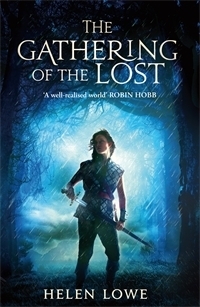
Helen: Thank you, Ian—I was over the moon when I found out, not just because the David Gemmell Awards are international, but also because they are reader voted, so making the shortlist suggests that readers see “The Gathering Of The Lost” as having merit. As a new writer still, that’s tremendously encouraging. Also, the Legend Award was set up to honour the legacy of David Gemmell, which was a formative one for me as an epic Fantasy reader and writer. I love the sweep of his stories and the sense of contending light and dark—but also the many shades of human fallibility between those extremes. And I have always been strongly drawn to his writing of heroism, sacrifice and duty, as well as the ability of friendship and love, in rare circumstances, to transcend ambition and self-interest.
I feel Gathering and my Wall Of Night series is very much its own story, but it does speak to similar themes: it’s heroic Fantasy, but the focus of the story is on the Derai, a people who believe they are champions of good, but are divided by prejudice, suspicion and fear. Gathering in particular is an adventurous story, full of roof top pursuits and forced marches by night, tourneys and battles, bands of brothers — and definitely sisters — but it’s also a story about friendship and love. So although, with a female leading character and a “green” based magic, The Gathering Of The Lost is carving out its own niche, it’s also true to the epic-heroic tradition epitomised by David Gemmell.
Ian: Congratulations to Helen—and The Gathering Of The Lost—for making the shortlist and being in the running to be both the first woman and the first Southern Hemisphere author to win the Legend Award. If you’d like to find out more about Helen you can check out her website and blog, and also read about her influences and love of Fantasy here.
Alternatively, if you just want to go straight to the Legend site and vote, click here (don’t forget to click on “vote” to complete the process.)
Filed under: Aussie authors, Interviews and Articles
















